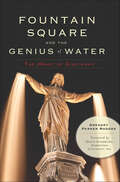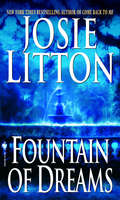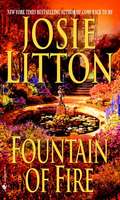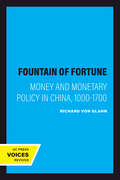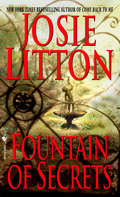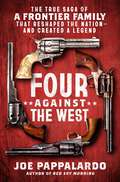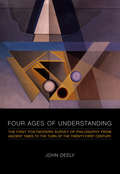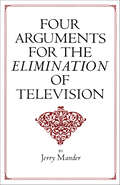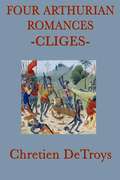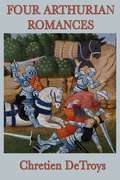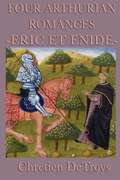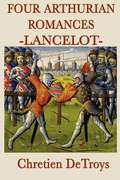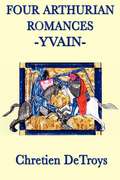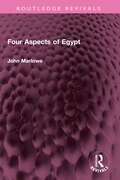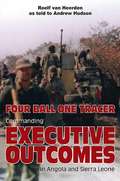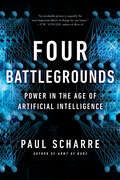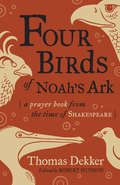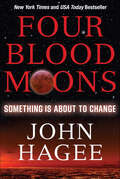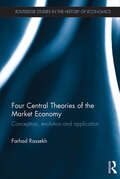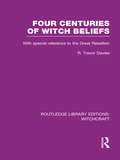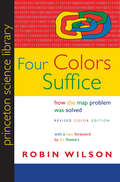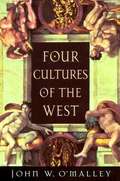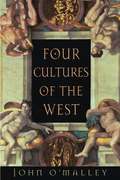- Table View
- List View
Fountain Square and the Genius of Water: The Heart of Cincinnati (Landmarks)
by Gregory Parker RogersIn 1871, Henry Probasco donated the Tyler Davidson Fountain to the people of the city of Cincinnati in honor of his brother-in-law. Probasco wanted to leave a practical and artistic gift to the city and its residents that had made both men fabulously wealthy. Though it was placed on Fifth Street, away from the central business district, the fountain became a centerpiece of the city around its boom years, and downtown Cincinnati grew up around the statue. Author Greg Rogers chronicles the history of the fountain and its influence on the landscape and culture of the city.
Fountain of Dreams (Akora)
by Josie LittonNew York Times bestselling author Josie Litton captivated readers with tales of the passionate--sometimes forbidden--unions between the fiery men and women of the island nation of Akora and those of mighty England. Now the next generation of lovers longs to follow suit--but new conflicts may prevent history from repeating itself.... Fountain of DreamsLovely, loyal, and strong-willed as her parents before her, Amelia Darcourt is nonetheless entirely unprepared for her reaction to her family’s compelling American visitor. The handsome young man is a match not only for her wits but for her heart. Yet no sooner does Amelia discover the attraction is mutual than she learns of a secret that may destroy her happiness. Could the man she is so drawn to have an ulterior motive for returning her affections--one involving the beloved island whose blood courses through her veins?Charged with a secret mission to investigate the disappearance of several American seamen believed imprisoned on Akora, Niels has come to England seeking Lord Alex Darcourt’s help in entering the fortress kingdom. But in spirited Amelia Darcourt he has found so much more. Their burgeoning passion has him caught between duty and desire. Loath to leave her side, Niels resolves to win her heart upon his return. But just as the two are destined to be together, they are destined to face the challenges that threaten to keep them apart. Only then will they be free to seal their love.
Fountain of Fire (Akora)
by Josie LittonThe legendary island nation of Akora endows its descendants with rare gifts. Now one compassionate young woman must discover her own extraordinary power--and her heart’s desire--by facing the greatest challenge of her life....Fountain of FireDaughter of a renowned Akoran warrior and an English-born beauty, Clio is content with her lot as a pretty, warmhearted girl among a family of compelling and exquisitely attractive people. Yet it is precisely her immensely soothing nature that is to bring her unexpected power--and passion. For a distressed young Queen Victoria has requested that Clio become her lady-in-waiting. During a time of political unrest, it is a position of inherent danger. But Clio is determined to be of service....Charged with safeguarding the queen from a suspected assassination plot, William, earl of Holyhood, is delighted to have the company of Clio. Not only is her sweetness a balm to the soul, but she is also, curiously, an Akoran princess. Long fascinated by the tantalizing island, William soon finds his interest superseded by an enchantment with Clio herself. Surprised by their deep mutual attraction, the couple have only to agree on how best to protect the queen--and themselves--from those who would steal their futures. But it is a task more easily said than done, and one that may hold the fate of an empire--and a blossoming love--in the balance.
Fountain of Fortune: Money and Monetary Policy in China, 1000-1700
by Richard von GlahnThe most striking feature of Wutong, the preeminent God of Wealth in late imperial China, was the deity’s diabolical character. Wutong was perceived not as a heroic figure or paragon but rather as an embodiment of greed and lust, a maleficent demon who preyed on the weak and vulnerable. In The Sinister Way, Richard von Glahn examines the emergence and evolution of the Wutong cult within the larger framework of the historical development of Chinese popular or vernacular religion—as opposed to institutional religions such as Buddhism or Daoism. Von Glahn’s study, spanning three millennia, gives due recognition to the morally ambivalent and demonic aspects of divine power within the common Chinese religious culture.Surveying Chinese religion from 1000 BCE to the beginning of the twentieth century, The Sinister Way views the Wutong cult as by no means an aberration. In Von Glahn’s work we see how, from earliest times, the Chinese imagined an enchanted world populated by fiendish fairies and goblins, ancient stones and trees that spring suddenly to life, ghosts of the unshriven dead, and the blood-eating spirits of the mountains and forests. From earliest times, too, we find in Chinese religious culture an abiding tension between two fundamental orientations: on one hand, belief in the power of sacrifice and exorcism to win blessings and avert calamity through direct appeal to a multitude of gods; on the other, faith in an all-encompassing moral equilibrium inhering in the cosmos.
Fountain of Secrets (Akora)
by Josie LittonIn a captivating tale that returns readers to the enchanting island nation of Akora, a remarkable young man and woman, torn between love for each other and duty to their homelands, discover that fate has not forgotten them.Fountain of SecretsHonorable, loyal, and deeply devoted to his family, Gavin, the eldest son of the earl of Hawkforte, is also a young man with a troubling secret. Disillusioned by the colonialist course his country is pursuing, Gavin has no wish to succeed his father. Rather, his heart is drawn toward the other half of his heritage--the wondrous kingdom of Akora and the life he senses awaits him there. His future will in fact be more astonishing than even he can imagine, but before it can begin, he must resolve his conflict--and his feelings for the woman he loves.Strikingly beautiful, intelligent, and dedicated to her homeland, Elena knows her fate is to be the wife and helpmate of the next ruler of Akora. Tragically, it is a destiny she believes must keep her apart from Gavin, the English nobleman who commands her heart. But together the couple will soon discover that the future cannot always be predicted--especially one that holds more hidden surprises, dangers, and rich rewards than either of them could have dreamed.
Four Against the West: The True Saga of a Frontier Family That Reshaped the Nation—and Created a Legend
by Joe PappalardoA thrilling true saga of legendary Texas figure Judge Roy Bean and his brothers―and their violent adventures in Wild West America.Roy Bean was an American saloon-keeper and Justice of the Peace in Texas, who called himself "The Only Law West of the Pecos". He and his three brothers set out from Kentucky in the mid 1840s, heading into the American frontier to find their fortunes. Their lifetimes of triumphs, tragedies, laurels and scandals will play out on the battlefields of Mexico, in shady dealings in California city halls, inside eccentric saloon courtrooms of Texas, and along the blood-soaked Santa Fe Trail from Missouri to New Mexico. They will kill men, and murder will likewise stalk them.The Beans chase their American dreams as the nation reinvents itself as a coast-to-coast powerhouse, only to be tested by the Civil War. During their saga, the brothers become soldiers, judges, husbands, guerillas, lawmen, entrepreneurs, refugees, fathers, politicians, pioneers and – in Judge Roy Bean’s case – one of the Old West’s best known but least understood scoundrels.Using new information gleaned from exhaustive research, Joe Pappalardo's Four Against the West is an unprecedented and vivid telling of the intertwined stories of all four Bean brothers, exploring for the first time how their relentless ambitions helped create a new America.
Four Ages of Understanding: The First Postmodern Survey of Philosophy from Ancient Times to the Turn of the Twenty-First Century (Toronto Studies in Semiotics and Communication)
by John DeelyThis book redraws the intellectual map and sets the agenda in philosophy for the next fifty or so years. By making the theory of signs the dominant theme in Four Ages of Understanding, John Deely has produced a history of philosophy that is innovative, original, and complete. The first full-scale demonstration of the centrality of the theory of signs to the history of philosophy, Four Ages of Understanding provides a new vantage point from which to review and reinterpret the development of intellectual culture at the threshold of "globalization". Deely examines the whole movement of past developments in the history of philosophy in relation to the emergence of contemporary semiotics as the defining moment of Postmodernism. Beginning traditionally with the Pre-Socratic thinkers of early Greece, Deely gives an account of the development of the notion of signs and of the general philosophical problems and themes which give that notion a context through four ages: Ancient philosophy, covering initial Greek thought; the Latin age, philosophy in European civilization from Augustine in the 4th century to Poinsot in the 17th; the Modern period, beginning with Descartes and Locke; and the Postmodern period, beginning with Charles Sanders Peirce and continuing to the present. Reading the complete history of philosophy in light of the theory of the sign allows Deely to address the work of thinkers never before included in a general history, and in particular to overcome the gap between Ockham and Descartes which has characterized the standard treatments heretofore. One of the essential features of the book is the way in which it shows how the theme of signs opens a perspective for seeing the Latin Age from its beginning with Augustine to the work of Poinsot as an indigenous development and organic unity under which all the standard themes of ontology and epistemology find a new resolution and place. A magisterial general history of philosophy, Deely's book provides both a strong background to semiotics and a theoretical unity between philosophy's history and its immediate future. With Four Ages of Understanding Deely sets a new agenda for philosophy as a discipline entering the 21st century.
Four Arguments for the Elimination of Television
by Jerry Mander“Persuasive . . . interesting and unusual.” —Kirkus ReviewsA total departure from previous writing about television, this book is the first ever to advocate that the medium is not reformable. Its problems are inherent in the technology itself and are so dangerous—to personal health and sanity, to the environment, and to democratic processes—that TV ought to be eliminated forever.Weaving personal experiences with meticulous research, the author ranges widely over aspects of television that have rarely been examined and never before joined together, allowing an entirely new, frightening image to emerge. The idea that all technologies are neutral, benign instruments that can be used well or badly is thrown open to profound doubt. Speaking of TV reform is, in the words of the author, “as absurd as speaking of the reform of a technology such as guns.”Praise for the work of Jerry Mander“Lively, provocative.” —Publishers Weekly“A skilled writer.” —Kirkus Reviews (starred review)
Four Arthurian Romances: Cliges
by Chretien DetroysIt tells the story of the knight Cligès and his love for his uncle's wife, Fenice. Because of the story's de-romanticized depiction of adultery, it has been called a criticism or parody of the Tristan and Isolde romances. Cligès scholar Lucie Polak not only verifies the Tristan and Isolde reworking found in the text, but also suggests that Cligès may be modeled after Ovid's character Narcissus.
Four Arthurian Romances: Complete
by Chretien DetroysChrétien's works include five major poems in rhyming eight-syllable couplets. Four of these are complete; Erec and Enide (c. 1170); Cligès (c. 1176), and Yvain, the Knight of the Lion and Lancelot, the Knight of the Cart, both written simultaneously between 1177 and 1181. Chrétien's final romance was Perceval, the Story of the Grail, written between 1181 and 1190, but left unfinished, though some scholars have disputed this.
Four Arthurian Romances: Eric Et Enide
by Chretien DetroysErec et Enide features many of the common elements of Arthurian romance, such as Arthurian characters, the knightly quest, and women or love as a catalyst to action. While it is not the first story to use conventions of the Arthurian characters and setting, Chrétien de Troyes is credited with the invention of the Arthurian romance genre by establishing expectation with his contemporary audience based on its prior knowledge of the subjects.
Four Arthurian Romances: Lancelot
by Chretien DetroysThe action centers on Lancelot's rescue of the queen after she has been abducted by Meleagant, the son of Bademagu. The Abduction of Guinevere is one of the oldest motifs in Arthurian legend, appearing also in Caradoc of Llancarfan's Life of Gildas and carved on the archivolt in Modena Cathedral.
Four Arthurian Romances: Yvain
by Chretien DetroysIn the poem, Yvain seeks to avenge his cousin Calogrenant who had been defeated by an otherworldly knight Esclados beside a magical storm-making stone in the forest of Brocéliande. Yvain defeats Esclados and falls in love with his widow Laudine.
Four Aspects of Egypt (Routledge Revivals)
by John MarloweFirst Published in 1966 Four Aspects of Egypt provides a picturesque tour of Egypt for visitors and new arrivals in the country. John Marlowe takes us on a journey by discussing the splendour and durability of the remains of Egypt’s ancient civilization; the mosques, tombs, khans (inns) and sibilas (fountains) of mediaeval Cairo; the total dependence of Egypt upon the Nile and its life-giving waters; and with efforts of modernization in the country, to capture its enchantment through descriptions of the land and its history. This book will be an interesting read for general readers interested in history of Egypt and travelogues.
Four Ball One Tracer: Commanding Executive Outcomes In Angola And Sierra Leone
by Roelf Van Heerden Andrew HudsonBrutally honest and devoid of hyperbole, this is Roelf van Heerden's Executive Outcomes. Unapologetic, unassuming and forthright, the combat exploits of Executive Outcomes (EO) in Angola and Sierra Leone are recounted for the first time by a battlefield commander who was physically on the ground during all their major combat operations. From fighting UNITA for the critical oil installations and diamond fields of Angola to the offensive against the RUF in Sierra Leone to capture the Kono diamond fields and the palace coup which ousted Captain Valentine Strasser, van Heerden was at the forefront. He tells of the tragedy of child soldiers, illegal diamond mining and the curse of government soldiers who turn on their own people; he tells of RUF atrocities, the harrowing attempt to rescue a downed EO pilot and the poignant efforts to recover the remains of EO soldiers killed in action. Coupled with van Heerden's gripping exposé, hitherto unpublished photographs, order of battle charts and battle maps offer unprecedented access to the major actions as they took place on the ground during the heydays of EO.
Four Battlegrounds: Power In The Age Of Artificial Intelligence
by Paul ScharreAn NPR 2023 "Books We Love" Pick One of the Next Big Idea Club's Must-Read Books "An invaluable primer to arguably the most important driver of change for our future." —P. W. Singer, author of Burn-In An award-winning defense expert tells the story of today’s great power rivalry—the struggle to control artificial intelligence. A new industrial revolution has begun. Like mechanization or electricity before it, artificial intelligence will touch every aspect of our lives—and cause profound disruptions in the balance of global power, especially among the AI superpowers: China, the United States, and Europe. Autonomous weapons expert Paul Scharre takes readers inside the fierce competition to develop and implement this game-changing technology and dominate the future. Four Battlegrounds argues that four key elements define this struggle: data, computing power, talent, and institutions. Data is a vital resource like coal or oil, but it must be collected and refined. Advanced computer chips are the essence of computing power—control over chip supply chains grants leverage over rivals. Talent is about people: which country attracts the best researchers and most advanced technology companies? The fourth “battlefield” is maybe the most critical: the ultimate global leader in AI will have institutions that effectively incorporate AI into their economy, society, and especially their military. Scharre’s account surges with futuristic technology. He explores the ways AI systems are already discovering new strategies via millions of war-game simulations, developing combat tactics better than any human, tracking billions of people using biometrics, and subtly controlling information with secret algorithms. He visits China’s “National Team” of leading AI companies to show the chilling synergy between China’s government, private sector, and surveillance state. He interviews Pentagon leadership and tours U.S. Defense Department offices in Silicon Valley, revealing deep tensions between the military and tech giants who control data, chips, and talent. Yet he concludes that those tensions, inherent to our democratic system, create resilience and resistance to autocracy in the face of overwhelmingly powerful technology. Engaging and direct, Four Battlegrounds offers a vivid picture of how AI is transforming warfare, global security, and the future of human freedom—and what it will take for democracies to remain at the forefront of the world order.
Four Birds of Noah's Ark: A Prayer Book from the Time of Shakespeare
by Thomas DekkerA timeless, little-known literary classic to engage a new generation of readers As the Black Death ravaged London in 1608, in the midst of societal chaos and tragedy, playwright Thomas Dekker wrote Four Birds of Noah&’s Ark, a book containing fifty-six prayers for the people of London and all of England. The prayers in this book bear witness to Dekker&’s deep faith with a power and poignancy that few written prayers in English literature achieve. Bringing Dekker&’s devotional classic back into print for the first time since 1924, editor Robert Hudson has annotated the prayers and modernized their language without sacrificing their enchanting beauty and simplicity. Hudson&’s substantive and illuminating introduction is a gem in itself.
Four Birds of Noah's Ark: A Prayer Book from the Time of Shakespeare
by Thomas DekkerA timeless, little-known literary classic to engage a new generation of readers As the Black Death ravaged London in 1608, in the midst of societal chaos and tragedy, playwright Thomas Dekker wrote Four Birds of Noah&’s Ark, a book containing fifty-six prayers for the people of London and all of England. The prayers in this book bear witness to Dekker&’s deep faith with a power and poignancy that few written prayers in English literature achieve. Bringing Dekker&’s devotional classic back into print for the first time since 1924, editor Robert Hudson has annotated the prayers and modernized their language without sacrificing their enchanting beauty and simplicity. Hudson&’s substantive and illuminating introduction is a gem in itself.
Four Blood Moons: Something is About to Change
by John Hagee". . .There will be signs in the sun, in the moon, and in the stars. . .Now when these things begin to happen, look up and lift up your heads, because your redemption draws near." Luke 21:25a, 28It is rare that Scripture, science, and history align with each other, yet the last three series of Four Blood Moons have done exactly that. Are these the "signs" that God refers to in His Word? If they are, what do they mean?What is their prophetic significance?
Four Central Theories of the Market Economy: Conception, evolution and application (Routledge Studies in the History of Economics)
by Farhad RassekhThis highly original work offers an intellectual history of four central theories underlying the market economic system, focusing on their conception, evolution, and applications. Four Central Theories of the Market Economy traces the root of the theories, their conception and articulation, as well as their evolutions to the present time. It focuses on the four theories that are generally recognized as fundamental to the discipline of economics: the invisible hand, comparative advantage, the law of markets, and the quantity theory of money. These theories have profoundly influenced the world. Chapters explore their rich intellectual history from classical Greece to today, drawing on the original works of the great economic minds of the classical era and other thinkers who prepared the path for them, as well as those who refined their works or challenged them. This volume will leave the reader with a deep understanding of these pillars of the market economic system in the context of their historical development. This book will be of great interest to all scholars and students of economics who are interested in the intellectual history of their discipline as well as scholars and students of intellectual history who are interested in economics.
Four Centuries of Witch Beliefs: With Special Reference To The Great Rebellion (Routledge Library Editions: Witchcraft)
by R. T. DaviesOriginally published in 1947, it is the essential purpose of this book to investigate attitudes of leading Elizabethan and Stuart statesmen, ask whether witchcraft was of any importance in seventeenth-century English history, or even influenced the Great Rebellion. The reader is placed in possession of the more pertinent passages from the arguments used to support or discredit belief in witchcraft.
Four Colors Suffice: How the Map Problem Was Solved - Revised Color Edition (Princeton Science Library #128)
by Robin WilsonOn October 23, 1852, Professor Augustus De Morgan wrote a letter to a colleague, unaware that he was launching one of the most famous mathematical conundrums in history--one that would confound thousands of puzzlers for more than a century. This is the amazing story of how the "map problem" was solved. The problem posed in the letter came from a former student: What is the least possible number of colors needed to fill in any map (real or invented) so that neighboring counties are always colored differently? This deceptively simple question was of minimal interest to cartographers, who saw little need to limit how many colors they used. But the problem set off a frenzy among professional mathematicians and amateur problem solvers, among them Lewis Carroll, an astronomer, a botanist, an obsessive golfer, the Bishop of London, a man who set his watch only once a year, a California traffic cop, and a bridegroom who spent his honeymoon coloring maps. In their pursuit of the solution, mathematicians painted maps on doughnuts and horseshoes and played with patterned soccer balls and the great rhombicuboctahedron. It would be more than one hundred years (and countless colored maps) later before the result was finally established. Even then, difficult questions remained, and the intricate solution--which involved no fewer than 1,200 hours of computer time--was greeted with as much dismay as enthusiasm. Providing a clear and elegant explanation of the problem and the proof, Robin Wilson tells how a seemingly innocuous question baffled great minds and stimulated exciting mathematics with far-flung applications. This is the entertaining story of those who failed to prove, and those who ultimately did prove, that four colors do indeed suffice to color any map. This new edition features many color illustrations. It also includes a new foreword by Ian Stewart on the importance of the map problem and how it was solved.
Four Comedies: The Braggart Soldier; The Brothers Menaechmus; The Haunted House; The Pot of Gold (Oxford World's Classics)
by Erich Segal PlautusPlautus was the single greatest influence on Western comedy. In fact, Shakespeare's Comedy of Errors and Moliere's the Miser are two subsequent classics directly based on Plautine originals. Plautus himself borrowed from the Greeks, but his jokes, rapid dialogue, bawdy humor, and irreverent characterizations are the original work of an undisputed genius. The comedies printed here show him at his best, and Professor Segal's translations keep their fast, rollicking pace intact, making these the most readable and actable versions available. This volume includes, The Braggart Soldier, e Brothers Menaechmus, The Haunted House, and The Pot of Gold.
Four Cultures Of The West
by John W. O'MalleyTHIS BOOK IS about four phenomena in the history of the West. I call them cultures. In illustrating their characteristics I make large use of my specialty, the history of Christianity. I have written the book for anyone interested in either of those two histories, which for long periods were in fact almost indistinguishable from each other. I have written it, therefore, for specialists, for students, and for the general reader. Specialists will be familiar with the persons, issues, and movements I discuss, but I hope that my approach will stimulate them to think about these subjects in a new way.
Four Cultures of the West
by John W. O'MalleyThe workings of Western intelligence in our day--whether in politics or the arts, in the humanities or the church--are as troubling as they are mysterious, leading to the questions: Where are we going? What in the world were we thinking? By exploring the history of four "cultures" so deeply embedded in Western history that we rarely see their instrumental role in politics, religion, education, and the arts, this timely book provides a broad framework for addressing these questions in a fresh way. The cultures considered here originated in the ancient world, took on Christian forms, and manifest themselves today in more secular ways. These are, as John W. O'Malley identifies them: the prophetic culture that proclaims the need for radical change in the structures of society (represented by, for example, Jeremiah, Martin Luther, and Martin Luther King, Jr.); the academic culture that seeks instead to understand those structures (Aristotle, Aquinas, the modern university); the humanistic culture that addresses fundamental human issues and works for the common good of society (Cicero, Erasmus, and Eleanor Roosevelt); and the culture of art and performance that celebrates the mystery of the human condition (Phidias, Michelangelo, Balanchine). By showing how these cultures, as modes of activity and discourse in which Western intelligence has manifested itself through the centuries and continues to do so, O'Malley produces an essay that especially through the history of Christianity brilliantly illuminates the larger history of the West.
